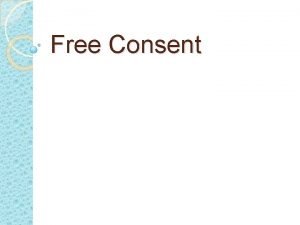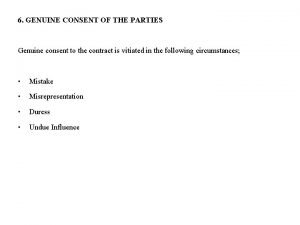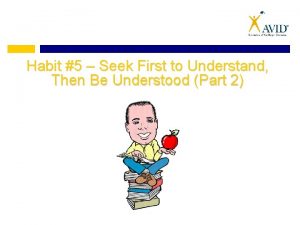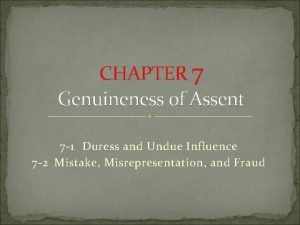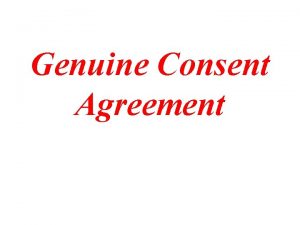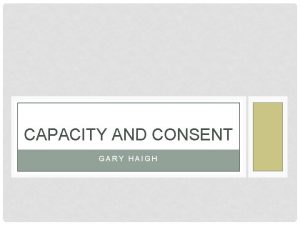6 GENUINE CONSENT OF THE PARTIES Genuine consent






- Slides: 6

6. GENUINE CONSENT OF THE PARTIES Genuine consent to the contract is vitiated in the following circumstances; • Mistake • Misrepresentation • Duress • Undue Influence

Mistake Either one party to the contract, or both parties to the contract entered in to the contract by making a mistake on a vital matter. Mistakes that render a contract void. • Mistake as to the nature of the contract itself E. g. : Foster v. Mackinnon (1869) L. R. 4 P. 704 • Mutual mistake as to the identity of the subject matter of the contract or the thing contracted for E. g. : Raffles v. Wickelhaus (1864) 2 H and C 906 • Mistake as to the identity of a party to the contract E. g. : Cundy v. Lindsay (1878) L. R. 3 App. Cas. 459 • Common mistake as to the existence of the thing contracted for E. g. : Scott v. Coulson (1903) 2 Ch. 249

Mistake that do not render a contract void • Mistake as to the quality or value of the items contracted for • Mistake of judgement • Mistake as to the meaning of a trade description, when goods are sold under their trade description • Mistake by one party of his ability to perform the contract

Misrepresentation A representation which is not true is called a ‘misrepresentation. ’ Representation is a statement made by the parties in this negotiation process. Following conditions are applicable in this regard; • It must be a representation of a material fact • The representation must have been made before the conclusion of the contract, with a view of inducing a party to enter in to the contract • It must have been made with the intention that it should be acted upon by the party to whom it was addressed to • It must have actually been acted upon and must have induced the party • It must have been false, to the knowledge of the person making it

Undue Influence Undue influence is when one party to a contract ‘unfairly’ or ‘unduly’ influences the other party to enter in to the contract. These contracts are voidable. Undue influence can be identified under two categories; 1. Actual undue influence – When one party actually influences the other party unduly to enter in to the contract. E. g. : Bank of Credit and Commerce v. Aboody (1989) 2 WLR 759 2. Presumed undue influence – When the law presumes that certain relationships can give rise to undue influence. E. g. : Re Craig (1971) Ch. 95

Duress Or Threat Actual violence or a threat of violence, directed at the other party of the contract or his family. A contract entered under duress is voidable. Types of duress; • Actual or threatened physical violence or imprisonment • Wrongful detention or threatened seizure of property E. g. : Maskell v. Horne (1915) 3 K. B. 106 • Threatening with criminal proceedings E. g. : Kaufman v. Gerson (1904) 1 K. B. 491 • Economic duress E. g. : D and C Builders Ltd. v. Rees (1966) 2 Q. B. 617
